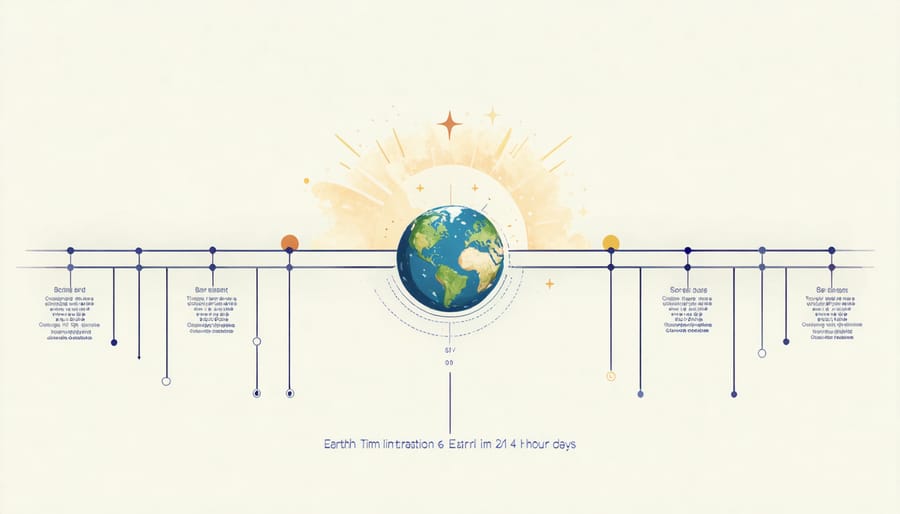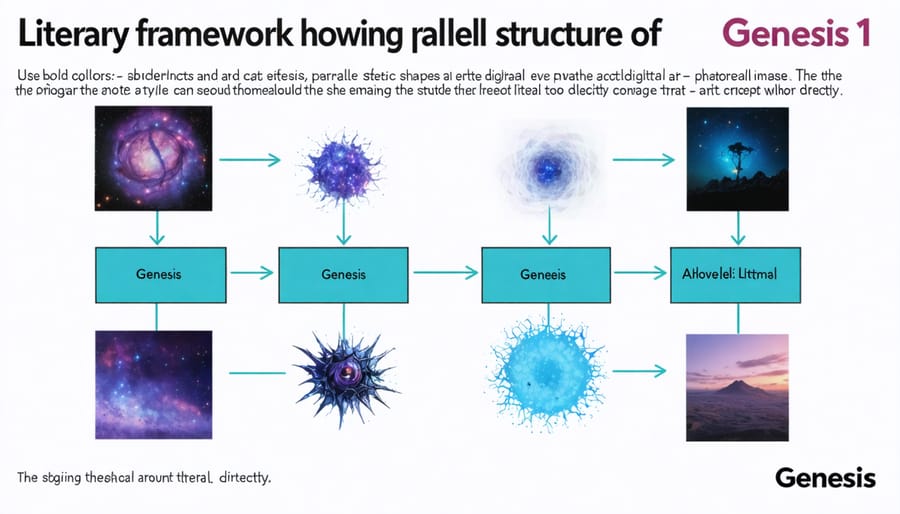Within the grand narrative of Scripture, how we understand the creation account in Genesis 1-2 profoundly shapes our approach to Christian environmental stewardship and our relationship with our Creator. For generations, faithful believers have thoughtfully examined these foundational chapters through different interpretative lenses, each seeking to honor both God’s Word and His works. While debates about creation timing and methodology have occasionally divided believers, understanding these various approaches can actually deepen our appreciation for God’s creative power and wisdom. As we explore three major creationist interpretations of Genesis 1-2, we’ll discover how each perspective offers unique insights into our role as stewards of God’s creation while maintaining the essential truth that “in the beginning, God created the heavens and the earth” (Genesis 1:1).
Young Earth Creationism: A Literal Six-Day Creation
Biblical Foundation
The foundation for understanding creation begins with the first two chapters of Genesis, which provide God’s revelation about the origins of the universe and humankind. Genesis 1:1 declares, “In the beginning God created the heavens and the earth,” establishing God as the sovereign Creator of all things. This foundational truth is reinforced throughout Scripture, including Psalm 33:6, which states, “By the word of the LORD the heavens were made, their starry host by the breath of his mouth.”
The creation account continues through two chapters, with Genesis 1 providing a structured overview of creation week, while Genesis 2 offers a more detailed focus on humanity’s creation and purpose. These passages employ various literary devices and Hebrew terms that have led to different interpretations within the Christian community.
Key interpretative principles include recognizing the historical and cultural context of the original audience, understanding the literary genre, and maintaining consistency with other biblical teachings. The New Testament affirms creation’s significance, with passages like John 1:1-3 and Colossians 1:16 highlighting Christ’s role in creation.
While Christians may differ in their interpretation of the creation timeline, all approaches affirm essential truths: God is the Creator, humans are made in His image, and we are called to be stewards of His creation.

Environmental Stewardship Implications
Each creationist approach to Genesis 1-2 carries distinct implications for how we view our responsibility toward God’s creation. Young Earth creationists often emphasize humanity’s God-given dominion over nature, interpreting Genesis 1:28 as a divine mandate for careful stewardship of Earth’s resources. This view typically promotes active environmental care while maintaining that God’s sovereignty ensures Earth’s ultimate preservation.
Day-Age creationists, seeing creation as unfolding over long periods, often emphasize humanity’s role in preserving the delicate balance of ecosystems that God established through time. This perspective frequently leads to strong support for conservation efforts, viewing them as participation in God’s ongoing creative work.
Framework interpretation advocates typically focus on humanity’s unique position as image-bearers tasked with representing God’s authority in creation care. They often emphasize that proper stewardship reflects God’s original temple-garden design for Earth, encouraging Christians to treat environmental responsibility as an act of worship.
Despite their differences, all three approaches agree on humanity’s fundamental calling to be faithful stewards of God’s creation, as emphasized in Psalm 24:1: “The earth is the Lord’s and everything in it.” This shared conviction provides common ground for Christians to work together in protecting and nurturing God’s creation.
Day-Age Theory: Harmonizing Science and Scripture
Scriptural Understanding
The book of Genesis opens with two powerful accounts of creation that have sparked deep theological discussions throughout Christian history. In Genesis 1:1-2:3, we find a structured narrative of God creating the universe in six days and resting on the seventh. This is followed by Genesis 2:4-25, which provides a more detailed account focusing on humanity’s creation and early existence in the Garden of Eden.
These passages use rich, poetic language and imagery to convey profound truths about God’s creative power and purpose. Key verses like Genesis 1:1, “In the beginning God created the heavens and the earth,” establish God’s sovereignty as Creator. The repeated phrase “And God saw that it was good” emphasizes the inherent value and purpose in creation.
Both accounts complement each other, though they present different perspectives and emphases. Genesis 1 provides a cosmic view of creation’s ordering, while Genesis 2 zooms in on humanity’s special role. Together, they form the foundation for understanding God’s relationship with creation and humanity’s responsibility as stewards of His world.
This scriptural framework has led Christians to develop various interpretative approaches, each seeking to honor the biblical text while engaging with scientific discoveries and cultural understanding.

Creation Care Perspective
From all three major creationist perspectives, there emerges a unified call for environmental stewardship rooted in Genesis 1:28, where God commands humanity to “have dominion” over creation. This divine mandate isn’t about exploitation, but rather careful management and protection of God’s created world.
Regardless of one’s interpretation of the creation timeline, Christians are called to be responsible caretakers of the Earth. This responsibility stems from understanding that creation reflects God’s glory and serves as a testament to His creative power. As Psalm 24:1 reminds us, “The earth is the Lord’s, and everything in it.”
Environmental responsibility takes on deeper meaning when we recognize that caring for creation is a way to honor the Creator. Whether through conservation efforts, sustainable practices, or simply appreciating and protecting natural habitats, Christians can demonstrate their faith through environmental stewardship.
This perspective encourages practical actions like reducing waste, practicing sustainable living, and supporting environmental protection efforts – not as political statements, but as acts of worship and obedience to God’s command to tend and keep the garden (Genesis 2:15). By caring for creation, we fulfill our role as God’s image-bearers and demonstrate love for both Creator and creation.
Framework Interpretation: Literary Structure Focus
Biblical Analysis
The literary approach to Genesis 1-2 focuses on understanding these chapters through the lens of their literary style and structure rather than strictly as a scientific account. This perspective recognizes that the Bible uses various literary genres to convey God’s truth, including poetry, narrative, and metaphorical language. When examining Genesis through this lens, we can appreciate how the text’s carefully crafted structure reveals deeper theological meanings about God’s relationship with creation.
For instance, the repetitive patterns in Genesis 1 (“And God said… and it was so”) and the parallel structure of the six days of creation point to a deliberate literary arrangement. This approach acknowledges that the primary purpose of Genesis wasn’t to provide a scientific explanation of creation but rather to communicate essential truths about God as Creator and humanity’s role in His creation.
The literary approach helps us understand these chapters’ theological significance while avoiding unnecessary conflicts between faith and science. It emphasizes that Genesis 1-2 powerfully declares God’s sovereignty, purpose, and love in creating the universe, focusing on the “who” and “why” of creation rather than the precise mechanisms of “how.” This interpretation maintains the text’s authority while allowing flexibility in understanding the specifics of God’s creative process.

Environmental Ethics
Across all three major creationist approaches, there is a unified understanding that humans bear significant creation care responsibilities as stewards of God’s world. This calling stems directly from Genesis 1:28, where God commands humanity to “have dominion” over creation. However, this dominion is consistently interpreted as wise stewardship rather than exploitation.
Each interpretative framework emphasizes that Christians are called to protect and nurture the environment as faithful caretakers of God’s handiwork. Whether one views creation as occurring over six literal days, long periods, or through a literary framework, the mandate to care for creation remains unchanged. This responsibility includes preserving biodiversity, practicing sustainable resource management, and addressing environmental challenges with wisdom and foresight.
The creation narrative reminds us that God declared His creation “very good” (Genesis 1:31), indicating its inherent value beyond human utility. As image-bearers of God, we are entrusted with the privilege and responsibility of tending to His creation with the same care and love He demonstrated in creating it. This understanding shapes how Christians approach environmental issues, encouraging active participation in conservation efforts while maintaining hope in God’s sovereign care over His creation.
Finding Common Ground in Creation Care
Despite differing interpretations of Genesis 1-2, Christians across various creationist perspectives share fundamental principles about our role as stewards of God’s creation. All three major approaches acknowledge that humanity bears a unique responsibility to care for creation as outlined in Genesis 1:28 and 2:15.
Whether one believes creation occurred over six literal days, long periods, or through a framework of divine ordering, the mandate to tend and protect God’s handiwork remains constant. We share the understanding that Earth’s resources and creatures are precious gifts from God, deserving our careful stewardship and protection.
Common ground can be found in recognizing that environmental responsibility flows directly from our love for the Creator. As Christians, we’re united in believing that nature reflects God’s glory (Psalm 19:1) and that we must honor Him through responsible management of His creation.
This shared commitment to creation care provides a beautiful opportunity for Christians of different interpretative traditions to work together. Rather than allowing our differences to divide us, we can focus on practical ways to fulfill our God-given responsibility as stewards. Whether through local conservation efforts, sustainable practices, or educational initiatives, we can demonstrate our love for God by protecting and preserving the world He entrusted to us.
While Christians may hold different views on the exact timeline and method of creation, we can unite in our divine calling to be stewards of God’s creation. Genesis 1:28 charges humanity to “have dominion” over the earth – a responsibility that transcends our interpretative differences. Whether we believe in a young earth, day-age creation, or framework interpretation, we share the common mission of caring for our planet as God’s appointed caretakers. This unified purpose reminds us that despite our varying perspectives on the “how” of creation, we can work together in preserving and protecting the magnificent world God has entrusted to us. As followers of Christ, let us focus on this shared commitment to environmental stewardship, demonstrating our love for the Creator through responsible care of His creation.
